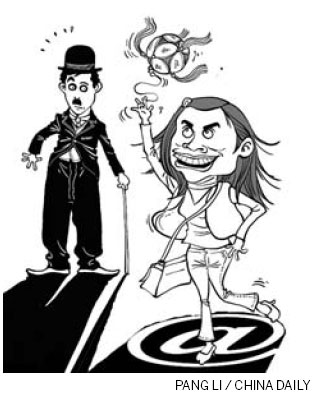 |
Large Medium Small |
The other day, Ellen was reading a magazine, and I glanced over her shoulder at a photograph of a rather plain looking woman.
"Who's that?"
"That's Sister Phoenix (Feng Jie), and she's very famous."
Well, I'd never heard of her, so I went away, did a little bit of research, and found out that she is famous indeed.
Famous for nothing.

Sister Phoenix's real name is Luo Yufeng, and she rose to fame on the Internet after she posted a series of messages explaining the type of man she wanted to marry.
Fame is a relatively new invention, brought about by the creation of ways of transmitting news quickly. Before the invention of the telegraph, fame was very limited - you actually had to have done something incredible enough for word to pass from person to person.
Now, it seems, anyone can be famous - for any reason.
All it takes is a wad of cash, some desperate people with computers, and you're away - messages are posted across cyberspace, pointing people back to a website, and the hits roll in.
If you're lucky enough, a lazy journalist with nothing better to do will see your story, and turn it into an article, thus creating more publicity for you. After a while, your face will be familiar to millions of people. Until, that is, someone new comes along.
Just as fame these days can be quickly created, it can also be fleeting. With so much information out there in the ether, it's not long before today's famous face is tomorrow's news.
Just take Shi Hengxia, or Sister Lotus (Furong Jiejie), as an example. In 2003 she posted a series of pictures on university forum boards, and became an overnight sensation.
When asked, my students sometimes tell me that they want to be "rich and famous" after they graduate - but when pressed, they usually say that they want to be "rich because they are famous". Unfortunately, they don't see the problems inherent in that idea. In order to be rich because you are famous, it implies that you are doing something that people are willing to pay money for.
We need to look back at those people who were famous before television and the Internet took over our lives, and examine just what made them famous.
Charlie Chaplin was probably the first world famous person in history. In an age that didn't have our instant information, broadcast around the world, around the clock, he had to rely on his raw talent to create something new and exciting.
His approach to making movies changed them forever, transforming them from short films without a plot, into feature length motion pictures that captivated audiences. Chaplin's character, "The Tramp" was instantly recognizable all over the world, and this gave rise to his fame.
And it's a fame that endures to this day.
Enduring fame is built on an idea that someone has created something so new, so groundbreaking, that the idea won't fade from memory.
Sister Phoenix and Sister Lotus aren't rich because they're famous - and they're unlikely to get rich any time soon, unless they develop a highly marketable talent.
Being famous for being famous won't pay the bills.
What China, and indeed the world, needs now is a new generation of famous people - famous for creating new ways to better help everyone globally.

China Daily